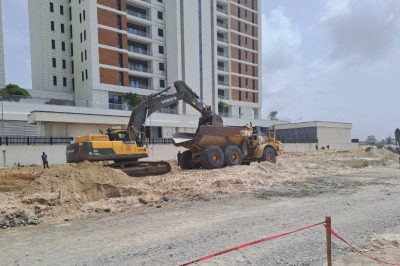
Nigeria has secured $747 million syndicated loan to finance phase 1, section 1 of the Lagos-Calabar coastal highway.
In a statement on Wednesday, Mohammed Manga, director of information and public relations at the ministry of finance, said the financing covers the 47.47 kilometre stretch from Victoria Island to Eleko Village in Lagos.
Manga said the financing marks the first syndicated road infrastructure loan of its size in Nigeria and is a strong signal of global investor confidence in the country’s reform trajectory and infrastructure pipeline.
He said the Deutsche Bank acted as global coordinator, initial mandated lead arranger and bookrunner and participated in the syndicate, alongside other regional and international lenders.
The director added that the Islamic Corporation for the Insurance of Investment and Export Credit (ICIEC) provided partial political and commercial risk insurance.
“The syndicate includes support from development finance institutions, export credit agencies and international commercial banks—notably First Abu Dhabi Bank, also acting as Agent across all facilities and Intercreditor Agent, whose involvement underscores its strong and growing support for Nigeria,” he said.
“Other lenders involved the African Export-Import Bank, the Abu Dhabi Exports Office (ADEX), the ECOWAS Bank for Investment and Development (EBID), Nexent Bank N.V. (formerly known as Credit Europe Bank N.V.) and Zenith Bank (through its UK, Paris and Nigeria offices).
“The project is structured as an EPC+F (Engineering, Procurement, Construction + Financing) contract awarded to Hitech Construction Company, one of Nigeria’s leading infrastructure firms.”
Manga said the structure aims at a strategic partnership between the government and the private sector, seamlessly aligning technical execution with financing solutions.
According to the statement, it enables fast-track project delivery while unlocking and maximising private sector appetite for investment in the country’s priority infrastructure.
He said the construction of phase 1, section 1 of the highway is already over 70 percent complete.
“The highway, constructed using Continuously Reinforced Concrete Pavement (CRCP), reflects a commitment to long-term resilience and efficiency. Engineered for a minimum lifespan of 50 years with minimal maintenance, it offers outstanding durability and cost-effectiveness,” the statement said.
“The project’s design and implementation have been shaped by comprehensive technical, legal, and environmental and social assessments, ensuring alignment with the highest international standards.
“The Lagos-Calabar Coastal Highway will serve as a vital trade and logistics corridor, enhancing regional integration, tourism, reducing transport costs, and creating jobs. A tolling strategy is currently being finalised to ensure the project’s operational and financial sustainability.
“These mechanisms will support a self-sustaining, concession-backed framework, helping to ensure long-term viability. Financing for subsequent phases is already being structured, with strong interest from regional and international investors.”
Manga said the landmark transaction reflects the renewed engagement of international financial institutions with Nigeria, driven by bold macroeconomic reforms and a commitment to delivering bankable, transformative projects.
‘TRANSACTION SIGNALS TO INVESTORS MATURITY OF NIGERIAN MARKET’
Speaking on the transaction, Wale Edun, minister of finance and coordinating minister of the economy, said it reflects the success of Nigeria’s macroeconomic reforms and the return of international capital to support its development.
He said the government is focused on funding infrastructure through approaches that are sustainable, transparent, and transformative—adding that the transaction exemplifies the vision in action.
“The closing of this market-defining financing is yet another testament to Mr President’s commitment to accelerate the participation of the private sector in infrastructure financing and development,” Edun said.
“It positions the country as being ready for a full transition to the design, development, financing as well as operations and management of critical public infrastructure through Public Private Partnerships.
“It signals to investors and private sector participants, the sophistication and maturity of the Nigerian market and commitment of the government to sanctity of contracts and innovative structures to fund critical national infrastructure that will deliver sustained and inclusive growth.”
David Umahi, minister of works, said the transaction is a vote of confidence in Nigeria’s economic reform agenda.
“The Lagos-Calabar Highway is a strategic national asset, and this financing sets a strong precedent for future public-private infrastructure partnerships,” he said.
On his part, Dany Abboud, managing director of Hitech Construction Company Limited, expressed pride in delivering the coastal highway project.
“With over 70% of Phase 1 Section 1 complete, we are showing that Nigerian engineering—backed by structured international finance—can meet global standards,” Abboud said.
“The use of CRCP technology ensures unmatched durability and cost-efficiency.”
Also speaking, Khalid Khalafalla, chief executive officer of the ICIEC, also expressed pride in partnering with the Nigerian government and fellow financiers to bring the Lagos–Calabar coastal highway project to fruition.
“Through ICIEC’s sovereign risk coverage solution, we are unlocking vital infrastructure that will ease congestion, stimulate regional trade, and drive inclusive economic growth,” he said.
Khalafalla noted that the project will generate jobs, enhance local skills, and support small and medium-sized businesses, underscoring ICIEC’s strong dedication to sustainable development, improved regional connectivity, and shared prosperity throughout West African communities.(The cable)

